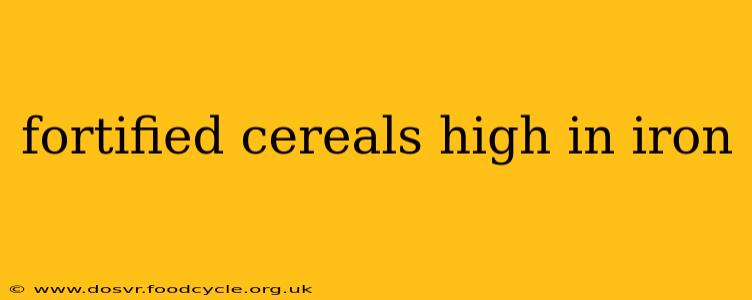Iron is a crucial mineral for our bodies, playing a vital role in carrying oxygen throughout the bloodstream and supporting energy levels. A deficiency can lead to fatigue, weakness, and other health problems. Many people find it challenging to meet their daily iron needs through diet alone, making iron-fortified cereals a convenient and effective option. This guide explores the benefits, considerations, and best choices when selecting fortified cereals high in iron.
What are Iron-Fortified Cereals?
Iron-fortified cereals are breakfast cereals that have added iron to boost their nutritional value. Many popular brands add iron to their products, significantly increasing the amount of this essential mineral in your daily diet. This fortification process is heavily regulated to ensure consistency and safety. The added iron is typically in a form that's easily absorbed by the body, enhancing its bioavailability.
Why Choose Iron-Fortified Cereals?
Iron-fortified cereals offer a simple way to increase your iron intake, particularly beneficial for those at risk of deficiency. These groups include:
- Vegetarians and Vegans: Plant-based sources of iron are often less bioavailable than those found in animal products.
- Women of childbearing age: Women experience higher iron needs due to menstruation.
- Pregnant women: Fetal development requires a significant amount of iron.
- Individuals with iron-deficiency anemia: Iron-fortified cereals can be a helpful component of a treatment plan, along with other dietary and medical interventions.
- Athletes: Increased physical activity can lead to higher iron requirements.
How Much Iron Do I Need?
The recommended daily allowance of iron varies based on age, sex, and health status. Consult a healthcare professional or registered dietitian for personalized recommendations. Checking the Nutrition Facts label on the cereal box will tell you how much iron is in a single serving. Remember that absorption rates can vary depending on other dietary factors.
What are the best fortified cereals high in iron?
Many cereals boast high iron content. Look for cereals that prominently feature "iron" on their nutrition facts label, often showcasing it as a percentage of the recommended daily value. Reading reviews and comparing nutritional profiles across different brands can help you identify the best option for your dietary needs and preferences. Be mindful that sugar content can vary significantly, so choose cereals that balance iron with overall healthy ingredients.
Are there any downsides to eating iron-fortified cereals?
While iron-fortified cereals are generally safe, consuming excessive amounts of iron can be harmful. Too much iron can lead to gastrointestinal issues like constipation. It's important to follow the recommended serving sizes and not exceed them. Individuals with certain medical conditions, such as hemochromatosis, should consult their doctor before significantly increasing their iron intake.
What other nutrients are in iron-fortified cereals?
Many iron-fortified cereals also contain other essential vitamins and minerals like B vitamins, fiber, and zinc. Choosing a cereal that provides a broader range of nutrients can contribute to a balanced diet. However, it is crucial to remember that cereals are just one component of a healthy diet.
Can I get enough iron from food sources alone?
While it's possible to get enough iron from a well-balanced diet rich in iron-rich foods like red meat, legumes, and leafy greens, it may be challenging for certain populations. Iron-fortified cereals can be a valuable supplement in these situations to help meet daily requirements.
How can I improve iron absorption from fortified cereals?
Pairing iron-rich foods with vitamin C-rich foods can enhance iron absorption. For example, having your iron-fortified cereal with orange juice can improve the bioavailability of iron. Avoid consuming iron-fortified cereals with substances that can inhibit iron absorption, such as coffee or tea.
By understanding the benefits and considerations surrounding iron-fortified cereals, you can make informed choices to support your health and well-being. Remember that a balanced diet and consulting with a healthcare professional are key to maintaining optimal iron levels.
